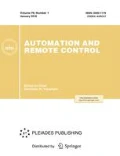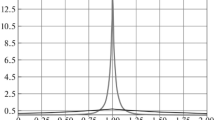Abstract
Social dynamics determined by voting in a stochastic environment is analyzed for a society composed of two cohesive groups of similar size. Within the model of random walks determined by voting, explicit formulas are derived for the capital increments of the groups against the parameters of the environment and “claim thresholds” of the groups. The “unanimous acceptance” and “unanimous rejection” group rules are considered as the voting procedures. Claim thresholds are evaluated that are most beneficial to the participants of the groups and to the society as a whole.
Similar content being viewed by others
References
Borzenko, V.I., Lezina, Z.M., Loginov, A.K., Tsodikova, Ya.Yu., and Chebotarev, P.Yu., Strategies of Voting in Stochastic Environment: Egoism and Collectivism, Autom. Remote Control, 2006, vol. 67, no. 2, pp. 311–328.
Chebotarev, P.Yu., Analytical Expression of the Expected Values of Capital at Voting in the Stochastic Environment, Autom. Remote Control, 2006, vol. 67, no. 3, pp. 480–492.
Chebotarev, P.Yu., Loginov, A.K., Tsodikova, Ya.Yu., Lezina, Z.M., and Borzenko, V.I., Analysis of Collectivism and Egoism Phenomena within the Context of Social Welfare, Autom. Remote Control, 2010, vol. 71, no. 6, pp. 1196–1207.
Anderson, S.P., Kats, A., and Thisse, J.-F., Probabilistic Voting and Platform Selection in Multi-Party Elections, Soc. Choice Welfare, 1994, vol. 11, no. 4, pp. 305–322.
Suijs, J., Cooperative Decision Making in a Stochastic Environment, PhD Dissertation, Tilburg: Tilburg Univ., 1998.
Aiyagari, S.R. and Peled, D., Social Insurance and Taxation under Sequential Majority Voting and Utilitarian Regimes, J. Econom. Dynam. Control, 1995, vol. 18, no. 8, pp. 1511–1528.
Zakharov, A.V., The Models of Political Competition: Literature Review, Ekonom. Mat. Metody, 2009, vol. 45, no. 1, pp. 110–128.
Author information
Authors and Affiliations
Additional information
Original Russian Text © P.Yu. Chebotarev, A.K. Loginov, Ya.Yu. Tsodikova, Z.M. Lezina, V.I. Borzenko, 2010, published in Problemy Upravleniya, 2010, No. 1, pp. 18–25.
Rights and permissions
About this article
Cite this article
Chebotarev, P.Y., Loginov, A.K., Tsodikova, Y.Y. et al. Voting in a stochastic environment: The case of two groups. Autom Remote Control 72, 1537–1547 (2011). https://doi.org/10.1134/S0005117911070198
Received:
Published:
Issue Date:
DOI: https://doi.org/10.1134/S0005117911070198



